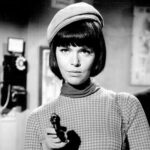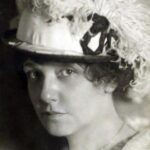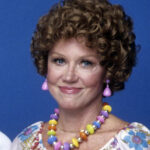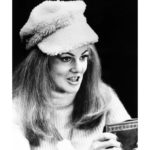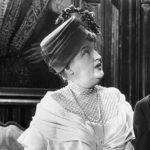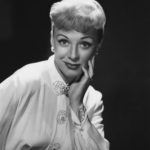Minnie Maddern Fiske (1865-1932) was one of America’s greatest actresses. She was born in 1865 in New Orleans to the manager of the St. Charles Theatre and of Lizzie Maddern, an actress. She began her theatrical career on stage at the age of three and was billed as “Little Minnie Maddern.” She made her New York debut in A Sheep in Wolf’s Clothing in 1870. In adolescence she toured across the country in melodramas and farces and performed in roles such as Little Eva in Uncle Tom’s Cabin, Prince Arthur in King John and other youthful roles. She then returned to the New York stage where she excelled in several plays. She achieved stardom in the role of Stella in In Spite of All (1885).
In 1890, she married Harrison Grey Fiske, editor of the influential New York Dramatic Mirror, and announced her retirement from the stage. Four years later, she could no longer resist the lure of the stage and appeared as Nora in A Doll’s House, which brought her recognition as a serious actress. Thereafter, she remained active in the theater until a few months before her death in 1932.
Together with others such as Sarah Bernhardt and David Warfield, Mrs. Fiske and her husband opposed the monopolistic Theatrical Syndicate in the early years of the century. As a consequence, the Fiskes were unable to secure rights to those plays by writers who were represented by the Syndicate. As in the case of Sarah Bernhardt and others who opposed the Syndicate, the Fiskes were forced to play in undesirable venues and even in tents. Harrison Fiske exposed the business tactics of the Theatrical Syndicate in 1897, which led to “a protracted libel case and the Syndicate’s banning of any productions featuring Fiske’s wife … Minnie Maddern Fiske.”
Since her husband’s opposition to the powerful Theatrical Syndicate prevented her from appearing in their theatres, the Fiskes rented the Manhattan (Theatre) in 1901. For six years, she played there with a splendid company, putting on a series of fine plays which were not equaled until the early years of the Theatre Guild.
In 1904, Minnie Maddern Fiske appeared on Broadway at the Manhattan Theatre in C.M.S. McLellan’s drama, Leah Kleschna, which Mary Elitch Long characterized as “one of the biggest successes of the decade.” She invited Mrs. Fiske to appear with her Manhattan Company in 1905 for a one week presentation of Leah Kleschna, with George Arliss and John Mason as part of her cast. Mrs. Fiske agreed and came direct to Denver from a thirty-one-week season of the play at her New York theater.
On the evening of May 25, 1905, Leah Kleschna was presented at Elitch. The audience was large and quite enthusiastic. A review commented on the “independent” management of Elitch Theatre:
It is a matter for sincere congratulation that the Theatrical Syndicate, which is able to shut Mrs. Fiske from most of the leading cities of the continent, does not control Elitch Gardens. To have been able to witness this finished actress in Leah Kleschna is, indeed, a cause for thanks. A presentation so thoroughly adequate as that at the Gardens last night is calculated to intensify the growing feeling among theatergoers that independence, after all, can be relied upon to bring forth the best in the drama as in other arts… It is noteworthy that most of the standing successes of the recent years have been under what is termed the “independent” management.
Frank W. White, drama editor of the Denver Post, extolled Mrs. Fiske’s virtues as an actress, then commented on “that rare voice of hers,” as follows:
That rare voice of hers, beautifully modulated, is still jerky and spasmodic, but it is also “soft and low,” like Cordelia’s, carrying infinite expression and fine intensity.
Frank L. Webster of the Denver Times commented as follows:
Seldom has Denver seen so finished and evenly balanced a production of a play as the presentation of Leah Kleschna at Elitch Gardens last night by Mrs. Fiske and her Manhattan company.
Just one thing mars the otherwise perfect performance. Particularly in scenes of excitement where the lines go rapidly, her enunciation is so indistinct, her words so run together that at times one can scarcely understand what she is saying.
During her lifetime, some believed that much of the criticism directed toward Mrs. Fiske “is suspect, possibly written by critics susceptible to the Trust’s bribes.” To others, however, Mrs. Fiske was admired “for the vivacity and naturalness of her acting.” The drama critic, Ward Morehouse, known for his column “Broadway After Dark” featured in the New York Sun, wrote of her.
Mrs. Fiske never had beauty, but she had magnetism. She had with all of her nervous, jerky manner, subtlety and finesse, and she was as much at ease in light-handed drawing-room comedy as she was in the problem plays of Ibsen.
In a brief biography of Mrs. Fiske in the International Dictionary of Theatre the following was noted:
She was known for her nervous, cerebral style, her tendency to speak lines quickly, as if conversing rather than declaiming, and her insistence on a “naturalness” of acting that included turning her back to the audience when the action demanded it (something that would never have been tolerated in the 19th-century US theatre). Her reputation as a “modern” actress resulted from this brittle, almost neurotic, performance style as well as from her choice of plays and supervision of productions.
In 1907, she returned to Elitch with her Manhattan Company for pre-season special performances of The New York Idea, and in 1908, she returned pre-season pre-season performance of lbsen’s Romersholm, which she had performed for a in New York in 1907. Bruce McRae and Mrs. Fiske’s Company appeared with her in the play at Elitch.
Mary Elitch characterized her treasured friendship with Mrs. Fiske as follows:
I have treasured the friendship of Mrs. Fiske through many years of our association, and I am sure there has never been a woman on the stage more loved and respected. Whenever she returns to Denver we share some happy hours, for she always dearly loved the trees and birds of my Gardens.
I recall an incident indicative of her rare thoughtfulness of others. She was filling an engagement at the Broadway Theatre; while her company rested she slipped away and came to visit me. This was quite early one Saturday morning, but my company was already busy at rehearsal. At Mrs. Fiske’s suggestion we tiptoed into a dark corner of my Theatre to watch. With her unfailing consideration of others she would not allow me to announce her presence for she realized that the young actors might feel embarrassed if aware that she was in the Theatre.
[Borrillo, T. A. (2012). Denver’s historic Elitch Theatre: A nostalgic journey (a history of its times). Colorado. pp. 66-68]






